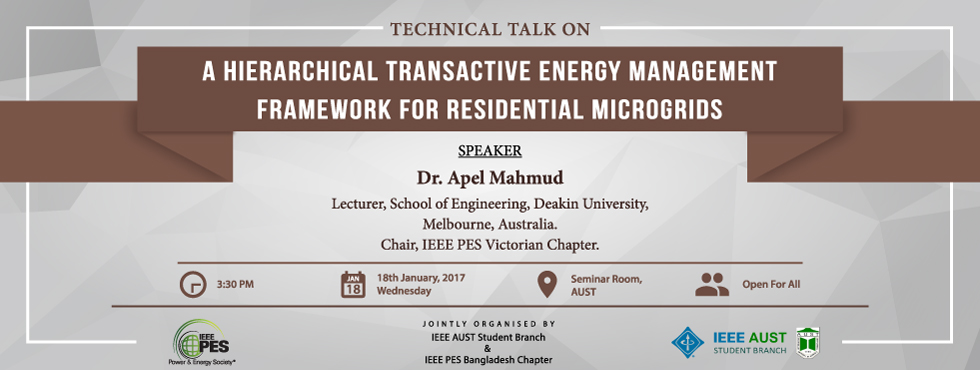Inter-university technical talk arranged at AUST
IEEE AUST Student Branch and IEEE PES Bangladesh Section jointly organized an inter-university technical talk on “A hierarchical transactive energy management framework for residential microgrids”. The event was held on 18th January, 2017 (Wednesday) from 3:45 PM to 4:45 PM at Seminar Room of Ahsanullah University of Science and Technology (AUST).

The speaker of the event was Dr.Apel Mahmud. Dr. Mahmud received his Bachelor degree in EEE with honors (first class first position) from Rajshahi University of Engineering and Technology (RUET), Bangladesh, in 2008 and the Ph.D. degree in electrical engineering from the University of New South Wales, Australia, with the best thesis award in 2012. In Australia, he worked as a research publication fellow at the University of New South Wales. He also worked as a research fellow at the University of Melbourne, Australia, and as a lecturer at Swinburne University of Technology, Australia. He is currently working as a lecturer at Deakin University, Australia. He is also serving as a Chair of IEEE PES Victorian Chapter and a committee member of IEEE PES Dynamic Performance Committee, USA. Dr. Mahmud has published over 120 scholarly articles in last six year including thirty-two high quality journal papers. His research interests include all aspects of power engineering, however, with major focus on microgrids.
This talk covered a hierarchical transactive energy management framework for a residential microgrid to share excess energy of prosumers with neighbors. A three-level hierarchical structure was discussed that facilitates energy management in different houses, energy sharing and transactions among neighbors as well as with the grid. The priority of sharing energy among different houses in a microgrid as well as with the grid is set in such a way that the houses, which have their own generation, will first fulfil their own demand. The power sharing among different houses demonstrates that there are some savings in electricity for a certain period. A generalized cost-benefit analysis framework has been developed by considering different tariff structures (flat rate and feed-in tariff) to assess the financial benefits of patrons to be involved in transactive energy management platform. Results from the analysis demonstrate that with the ever decreasing feed-in tariff, not only the prosumers but the residents without renewable energy sources and energy storage systems can be benefitted through the proposed transactive energy management scheme.
Among the attendees of the event were twenty faculty members from the Department of EEE, AUST including Prof. Dr. Abdur Rahim Mollah, Dean of Engineering Department, Prof. Dr. Satyen Biswas, Head of EEE Department. Over sixty students from different universities participated in the event.
